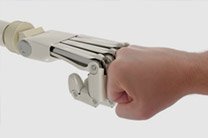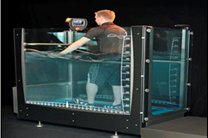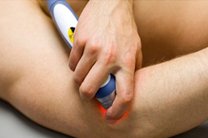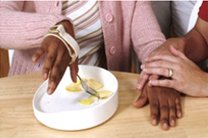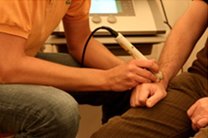Home Hydrotherapy
Hydrotherapy is a very versatile treatment that is used to treat a huge variety of patients with a range of rehabilitation goals. Exercise in water offer particular therapy benefits, easing discomfort and promoting both physical and mental wellbeing.
Hydrotherapy Treadmills have an integrated treadmill and can be used for all ages and levels of mobility. Simply walk in and select the desired water height and treadmill speed for a personalised hydrotherapy programme. The allure of underwater lighting and panoramic visibility enhances the experience and aids analysis. HYDRO PHYSIO has a multitude of uses, including rehabilitation, wellbeing and training.
How it works……
Hydrotherapy works by using the specific properties of water like increased buoyancy, increased resistance, increased hydrostatic pressure and maintained temperature
- Buoyancy helps the therapist to unload patient’s weight by adjusting water depth of the pool and hence optimize the load as per load bearing capability of the patient. (Unweighing). Typically, aquatic treadmills, exercising waist deep in water, experience around 50% reduction in effective body weight; this can be particularly helpful during rehabilitation and exercise.
- The surface tension and resistance of water adds resistance to specific muscle group, increases work out intensity, supports weak muscles and limbs, Improve balance of patients etc. “Water... a Helping Hand...’ Water offers approximately 10 times more resistance to motion than air. This supportive environment boosts user confidence and promotes slower, more deliberate movements, which aids monitoring and analysis.
- Hydrostatic pressure reduces heart-rate and arterial pressure by assisting circulation and increases metabolic rate and calorie burn.
- The maintained temperature increases the circulation, relaxes muscles and relieves pain
Benefits of Hydrotherapy………
- Studies show that walking in water can promote calorie consumption, lower blood pressure and boost the respiratory system. Trials with Hydrotherapy included bariatric (Obese) patients, who had been previously unable to exercise, the convenient access and ability to train in water at waist height, effecting a 50% reduction in body weight, allowed these patients to start exercising and motivated them to continue. They subsequently recorded significant weight loss at the end of the training programme.
- In today’s hectic world people are suffering from an increasing number of stress related conditions. Users of Hydrotherapy regularly report a positive improvement in their stress levels and a greater feeling of wellbeing, both during and after training.
- As an essential part of a training programme Hydrotherapy can be utilised for a low impact, challenging workout for athletes. Water walking alone has significant training advantages over land based training. Many athletes sustain over-training injuries and Hydrotherapy can help to reduce this possibility.
- When compared to conventional land based exercise, exercising upright in water can improve cardiovascular strength and overall fitness, with significantly reduced load bearing and stress on joints.
- Due to the effects of the natural properties of water, exercise following injury can commence at the earliest possible stage, facilitating a faster return to optimum levels of fitness or pre-trauma health.
Conditions Treated
Hydrotherapy is a very versatile treatment that is used to treat a huge variety of patients with a range of abilities and rehabilitation goals. Common conditions treated include:
Neurological conditions
- Stroke
- Head injury
- Spinal injury
- Parkinson’s disease
- Multiple Sclerosis (MS)
- Muscular Dystrophy
- Cerebral Palsy (CP)
- Guillain-Barré syndrome (GBS)
- Fibromyalgia
- Motor Neurone disease (MND)
- Chronic Fatigue syndrome
Arthritis
- Osteoarthritis (OA)
- Rheumatoid arthritis (RA)
- Juvenile arthritis
- Ankylosing spondylitis (AS)
Low back, thoracic or neck pain
- Chronic low back / neck pain
- Sciatica
- Whiplash
- Disc herniation
- Laminectomy
Musculoskeletal injury
- Sports injuries
- Muscular / joint injury or fracture
- Performance Enhancement
Learning difficulties
- development delay
- dyspraxia
Post-surgery
- Hip / knee replacement
- ACL/PCL reconstruction
- Surgically managed fracture
- Spinal Surgery
Cardiac Rehabilitation
- Post MI (heart attack)
- Post heart surgery
Wellness
- Obesity- Weight Loss Programs
- Sleep Disorders






